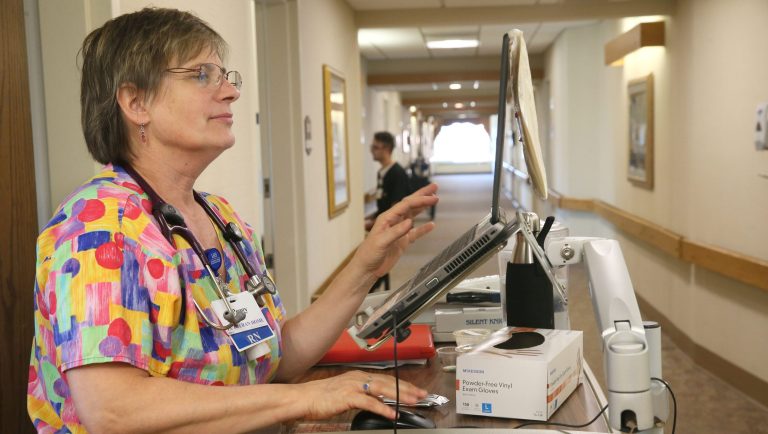
On Monday, special election workers will be able to help people living in nursing homes and other long-term care facilities in Wisconsin fill out absentee ballots for the Nov. 5 election.
The subtleties of absentee voting procedures in long-term care facilities typically receive little attention. The goal of the state law is to make it possible for people in a variety of situations to vote, including those who lack transportation to a polling place or those who are confined to long-term care facilities.
The COVID-19 pandemic has hit seniors and people with disabilities hard when it comes to voting. In the spring of 2020, state election officials made temporary changes to absentee voting procedures that later spurred false claims of widespread voter fraud in the Joe Biden-Donald Trump campaign. used to spread the word.
This fall, the long-term care voting process will proceed as usual, with voters choosing between Trump and Democratic candidate Kamala Harris for president. We'll explain in detail what happened last time and how it will work this time.
2020 procedural changes led to an increase in false claims of election fraud
Under state law, people living in long-term care facilities such as nursing homes, assisted living homes or “retirement homes” can request a “special voting member” to visit the facility. The job of sworn election workers is to work in pairs to help people vote by absentee ballot.
The Wisconsin Elections Commission first recommended against following these procedures in March 2020 and later expanded its guidance to subsequent elections. The commission recommended that it would be safer to mail absentee ballots instead of sending special voting agents directly to facilities to avoid the spread of COVID-19. Waiting for absentee ballots to be mailed could leave some residents with insufficient time to vote, commissioners said.
This meant that the job of helping residents vote fell to facility staff. Racine County Sheriff Christopher Schmalin later called for felony charges against state election officials, alleging that these protocol changes facilitated fraud. The Racine County District Attorney subsequently declined to pursue these charges, citing lack of jurisdiction.
Some argued that changes to absentee voting procedures were a necessary safeguard to ensure residents could vote safely. By fall 2020, more than 100 nursing home residents were dying from the virus each week in Wisconsin, and long-term care facilities were closing to visitors.
Such claims became a central focus for Wisconsin Republicans who questioned the results of the 2020 presidential election. This is despite evidence from recounts, independent audits, and reports from conservative groups all showing that Biden, not Trump, won Wisconsin by more than 20,000 votes.
More information: What you need to know about assisted living in Wisconsin: Admissions, costs, services and more
Special voting members will begin visiting facilities starting October 14th.
This fall, the first day special voting members can legally visit long-term care facilities to assist with absentee voting will be Oct. 14, the fourth Monday before the election. Election officials will make the required two visits to each eligible facility upon request until 5:00 p.m. on Nov. 4, the last Monday before the election.
Special voting agents will only be sent to facilities where someone has requested them. An assisted living facility, nursing home or other eligible retirement community must have at least five registered voters who requested an absentee ballot to be eligible.
Special voting agents are appointed at local government level. For example, the city of Milwaukee has 14 poll workers ready to go to long-term care facilities this fall. Waukesha has 20 and West Allis has 10.
In response to questions from the Journal Sentinel, city officials in each region said they have enough election workers to meet demand and are ready to begin the election process.
In April, the Wisconsin Disability Vote Coalition released a statement saying long-term care facility residents have “no different voting rights than any other Wisconsin resident.”
“Regardless of the reason or length of their stay in a nursing home, these residents will retain their right to vote unless a court decides otherwise,” the statement said.
Where can I find more information about voting in residential care facilities?
It is not the job of special voting agents to help you decide who to vote for. However, these election workers have the authority to help someone fill out a ballot. Their job is also to deliver the ballots to responsible local election officials so they can be counted.
In some cases, election registration staff may visit the facility to help residents register to vote. Otherwise, long-term care facility residents must already be registered to vote and have submitted an absentee ballot request before the special voting agent arrives at the facility.
Under state law, special voting representatives will make two visits to the facility to assist voters.
For more information about the special voting process for long-term care facilities, visit elections.wi.gov/what-voters-residential-care-facilities-need-know.
(This story has been updated with additional information).
Cleo Kureishi is a Report for America corps member based at the Milwaukee Journal Sentinel, covering education and workforce development. Contact me at CKrejci@gannett.com or follow me on Twitter @_CleoKrejci. For more information about Report for America, visit jsonline.com/rfa.

